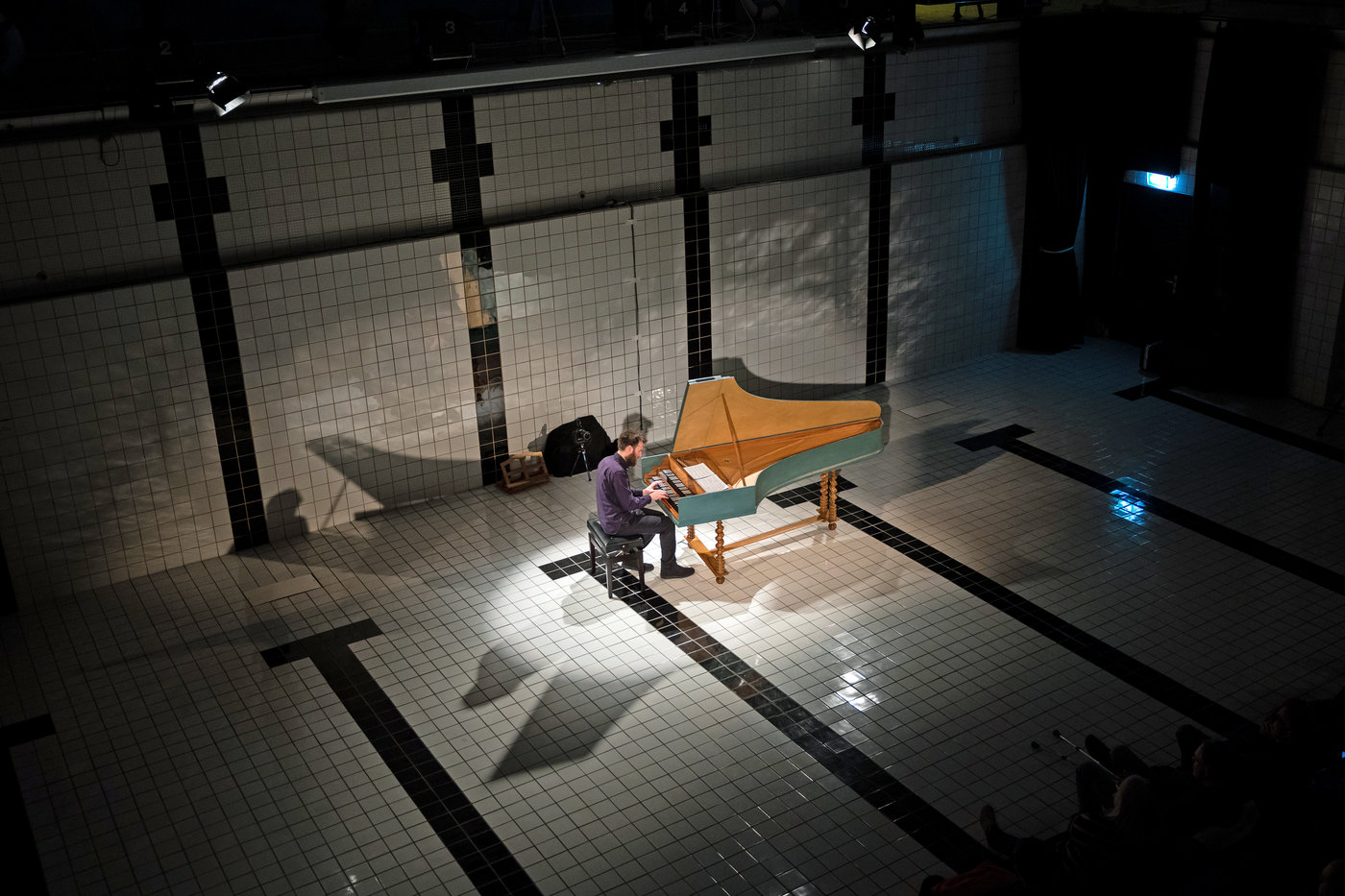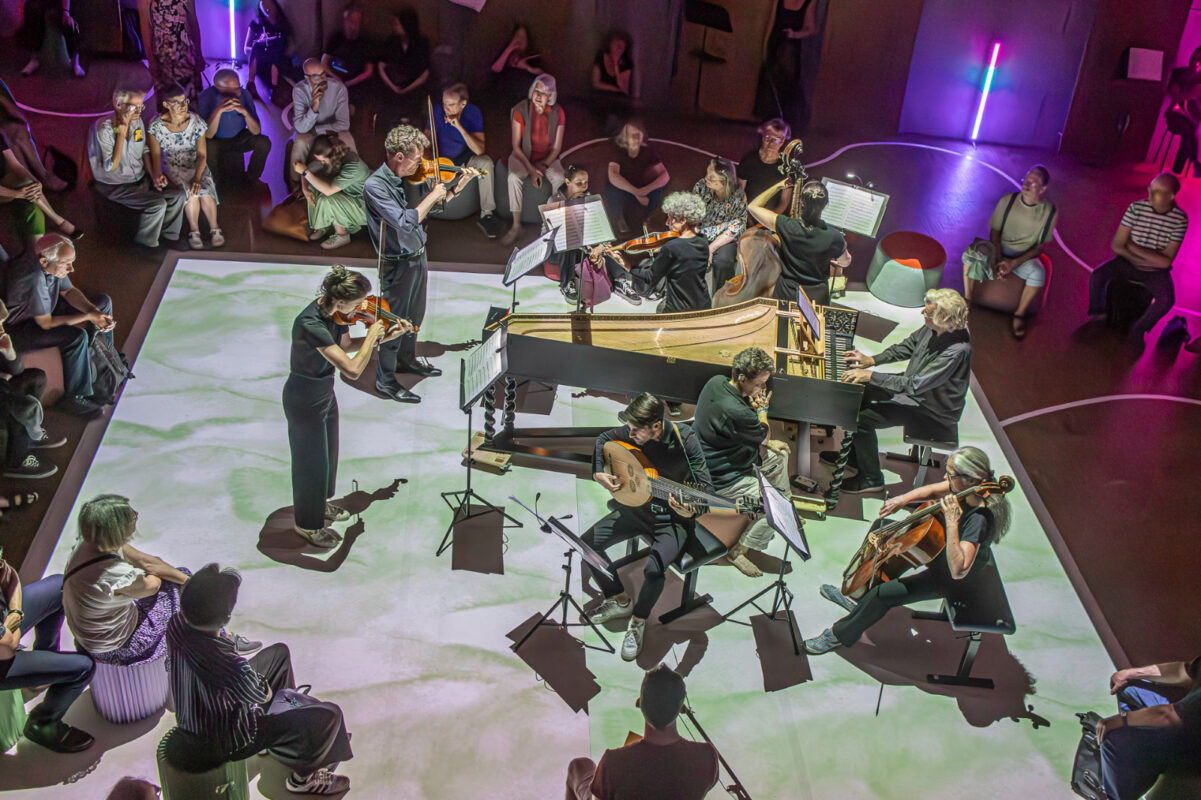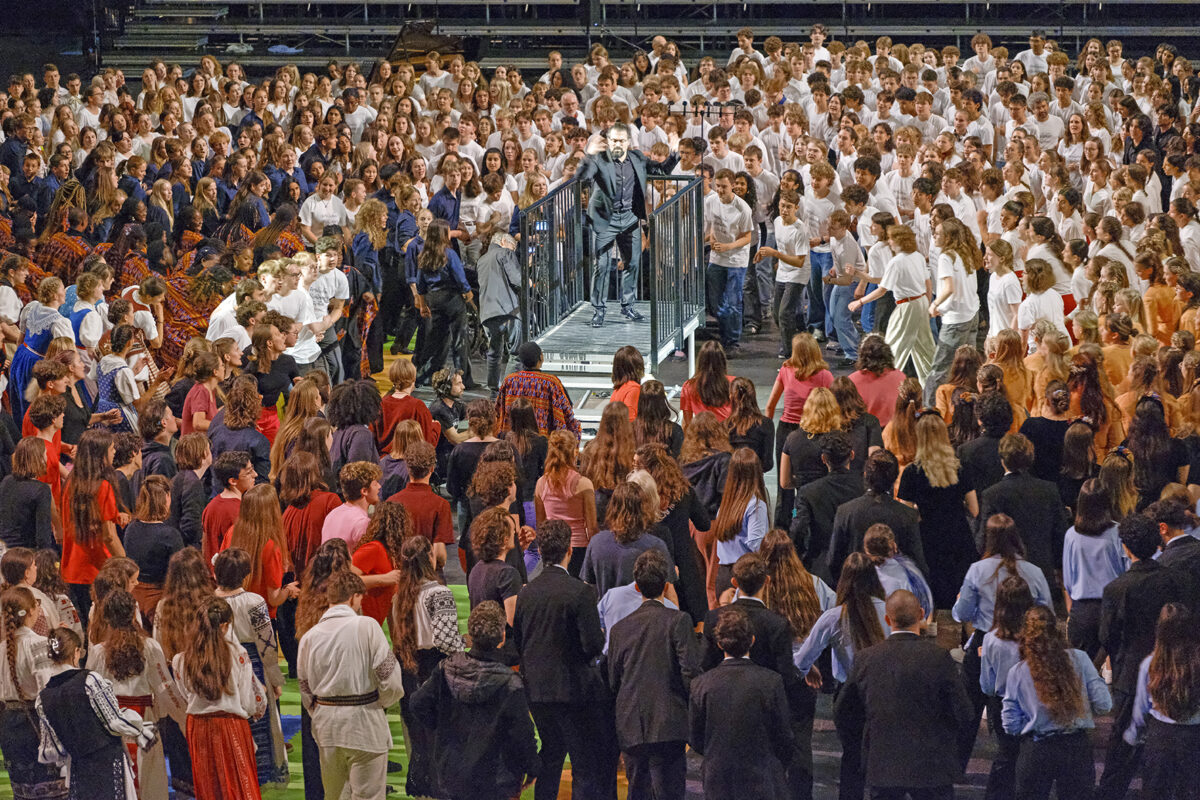Le Piano Symphonique - a piano festival in Lucerne
Lucerne has a piano festival again. From February 7 to 11, recitals and piano concerts can be heard, some of which will be brought together in a playful way.

Floodlights hang from the diving tower. The water slide leads to dry land. People have not been swimming here in Lucerne's former indoor pool for a long time. Ten years ago, an alternative cultural center with a club and restaurant was established under the name Neubad.
This evening at the late-night concert of the piano festival "Le Piano Symphonique", there is a harpsichord in the swimming pool. The audience listens from the edge of the pool or has taken a seat on a stand, lying down rather than sitting, to listen to the sounds of French harpsichord star Jean Rondeau. The Prélude en la mineur by Jean-Philippe Rameau begins like an improvisation: free, with deliberately placed pauses, listening to the notes. The delicate harpsichord sound is enhanced by the white tiles of the cymbal. A concentrated, almost meditative atmosphere is created between the lifebuoy and the starting blocks. The Suite en la is a discovery. The Courante phrases Rondeau jazzy. Every trill is a small work of art! The broken chords in François Couperin's La Ténébreuse (Allemande) resemble outbursts of emotion, which are expressed in the Marche des Scythes of Pancrace Royer with spectacular runs to a real frenzy. After his celebrated Lucerne debut, Rondeau comes to the pool bar, orders a cup of tea and mingles with the rest of the audience.
The Lucerne Symphony Orchestra's piano festival is a guest at the Neubad for the first time. "I find it exciting to present the harpsichord in this setting. The fact that we have now also found a new audience here is a nice side effect," says Artistic Director Numa Bischof Ullmann during a conversation in the café the following day.
Start with Brahms, continue with Schumann
In 2019, the Lucerne Festival discontinued its fall piano festival. The disappointment in the city was huge. When the Culture and Convention Center (KKL) finally issued a call for tenders to bring a piano festival back to life, Bischof Ullmann drafted his concept for "Le Piano Symphonique" - and was awarded the contract. The first festival in 2022 was dedicated entirely to Johannes Brahms and was well received.
This year, Rudolf Buchbinder opened the concert series with delicate Mozart variations on Ah, vous dirai-je, Maman KV 256, a very straightforward piece that comes to a head at the end. Appassionata and taken a little too massively Symphonic Etudes op. 13 by Robert Schumann, the focus composer of this year's festival. The rich program includes other big names such as Evgeny Kissin in the special concert or Khatia Buniatishvili, but also newcomers such as the only 18-year-old Israeli Yoav Levanon, who will perform Ignacy Jan Paderewski's rarely played piano concerto with the Lucerne Symphony Orchestra at the KKL at the request of the artistic director. It is unusual for Víkingur Ólafsson to give a piano recital in the second half of the concert.
"We want to be playful with concert formats and give the artists the right setting. This also includes traditional forms." Bishop Ullmann wants to celebrate the piano canon, but also bring the unknown to light. There will be a world premiere next year. He is relaxed about the fact that the Lucerne Festival is now relaunching a piano festival curated by Igor Levit in May, as the focus is too different.
Martha Argerich has long been associated with the Lucerne Symphony Orchestra. In the packed KKL, she truly presents Robert Schumann's piano concerto as the fantasia it was originally intended to be: with delicate color changes, urgent melodies and effortless virtuosity. She never plays the main theme in the first movement in the same way. The pianist is completely interwoven with the orchestra, which Michael Sanderling carefully guides around all the cliffs. Only in the finale is there a slight hitch in the interplay from time to time. But the delicate transitions, for example from the intermezzo to the finale, succeed as if from a single mold. Argerich works her magic, making the grand piano sound like a celesta in the treble and turning the thunderous chord breaks into elegant peaks. And, rarely enough, she gives two encores: a completely internalized Of foreign countries and people from Schumann's Children's scenes and a delicate gavotte from Bach's English Suite III in G minor.
A spirit of optimism
Before the interval, Johannes Brahms' Symphony No. 3 was heard in its entire range between lyrical pause and dramatic, combative outburst. Chief conductor Michael Sanderling, who arrived from Dresden in the fall of 2021, sees Johannes Brahms as an "essential gateway to the great Romantic repertoire". A complete recording of the four symphonies and the Piano Quartet in G minor arranged for orchestra by Arnold Schoenberg will be released in a few weeks.
The purely privately financed expansion of the orchestra from around 50 positions when the Artistic Director took office in 2004 to around 80 at present now creates the conditions for the appropriate realization of large-scale works. While elsewhere the brakes are being applied to cut costs, the Lucerne Symphony Orchestra is in a spirit of optimism. A new orchestra house provides optimal rehearsal and recording conditions. Sanderling is enthusiastic about the support in the city and the quick grasp of his orchestra members. The harmony can also be heard in Brahms' 3rd Symphony. The strings in particular respond quickly and sensitively to Sanderling's clear, relevant conducting. There is still room for improvement in the winds, which are not quite homogeneous. In the finale, Sanderling unleashes the pent-up orchestral forces and allows the movement to calm down again. And the Lucerne audience celebrates its ever-expanding orchestra.
Piano festival "Le Piano Symphonique", until April 11.
symphonyorchestra.ch








